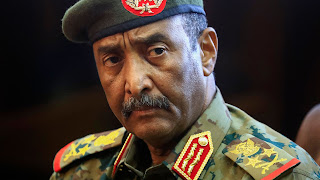US Engagement in Sudan: Geopolitics
This led to surprise when the U.S. engaged with Sudan. Secretary of State Blinken welcomed pre-negotiation talks between Sudanese Armed Forces and Rapid Support Forces in Jeddah, but Saudi mediation does not address concerns about Sudan's democratic transition.
Understandably, Saudi Arabia has pressing priorities like preventing a civil war in Sudan and stabilizing the Red Sea. The Biden administration should support Riyadh’s efforts instead of promoting democracy now. No democrats or pacifists in Sudan. Struggled with autocracy and civil wars since independence in 1956.
Recovering from a brutal dictatorship. Sudan is divided by two opposing leaders - Abdel Fattah al-Burhan and Mohamed Hamdan Dagalo (aka Hemeti).
The primary external actors, including Egypt, Saudi Arabia, and the United Arab Emirates, are Arab countries.
Burhan manages the Nile conflict; controls Port Sudan. Emiratis support Hemeti, who controls Darfur's gold mines. Profits in Emirati banks. On Capitol Hill, the opinion is to sanction Sudan for democratic transition. Sen. Risch urged sanctions on Generals Burhan and Hemetti and to limit aid from external actors to the junta, although US ties with Egypt, Saudi Arabia, and UAE are already strained.
Sanction threats could alienate crucial allies needed to manage the crisis. High stakes. Sudan may become another foreign-backed civil war like Libya, warns the UN. The IOM reported a doubling of displaced persons to 700,000 as of May 9 due to fighting.
Port Sudan is a crucial trade hub and landing point for a significant African undersea cable system. In 2021, a port blockade left 950 containers stranded and caused significant obstructions. Factional fighting since April 15 has resulted in over 600 deaths and 5,000 injuries.
A civil war in Sudan could disrupt the regional economy and provide a haven for terrorists, threatening efforts to stabilize the Sahel region. Osama bin Laden spent five years in Sudan developing a global terrorist organization before being expelled.
Putin is also ready to exploit the conflict in Libya.
The Ukraine war exposed Russia's military weaknesses. Putin's interventions in weak states have shown small deployments can lead to geopolitical rewards, especially if the US and its allies work against each other. Russian military contractor, Wagner Group has filled the void left by the French retreat in Africa, making Putin popular in many African states.
Putin is collaborating with Xi Jinping in Africa to challenge U.S. dominance and gain control of valuable resources. Russian Foreign Minister Lavrov toured Africa in February, criticizing European imperialism and promoting multipolarity while positioning Russia as an alternative to the U.S.-led order.
The Kremlin aims to increase influence in Sudan to also sway Egypt, Saudi Arabia, and UAE towards Moscow and Beijing. Egypt's President was caught negotiating to produce rockets for Russia, which he denied.
Lesson: Moscow is courting Egypt, and Cairo is open to it. Reviving ties between the Soviet Union and the Middle East/Africa is part of Putin’s plan, and Sudan serves as a gateway.
In 2020, Russia announced plans to build a naval facility in Sudan under a 25-year lease. The Wagner Group's presence in Darfur is aiding Russia in establishing a corridor to its positions in Libya and the Central African Republic.
In Sudan's civil war, Russia supports both sides: militarily with Burhan and through Prigozhin's aid to Hemeti. Burhan and Hemeti are from different areas of Sudan. Burhan is respected in Khartoum and represents the northern region with historical ties to Egypt.
Hemeti is from Darfur, a region in modern Sudan with an unbridgeable ethnic divide. No clear winner is expected to gain complete control of the country, and Russia may still have influence.
The US aims to decrease its foothold and erase it if feasible.
Biden has helpful partners. Israel also engages with Burhan and Hemeti to keep Sudan in Abraham Accords. In Sudan, Saudi and Israeli interests align. Riyadh avoids picking a winner, as with Jerusalem.
Blinken's engagement with Riyadh is the topic at hand.
Biden can use Saudi-brokered talks to unite US Middle Eastern partners, including Israel, and prevent Russia and China from destabilizing the Red Sea region. Blinken talks about democracy in Sudan, but actions show focus shifted from promoting it. China, Russia, and Iran oppose U.S. leadership. To boost Washington's position in the Red Sea, it's key to work with allies to broker a Hemeti-Burhan cease-fire.
This offers a chance to repair ties with Arab allies and use the Abraham Accords as a tool against Moscow and Beijing.


Comments
Post a Comment